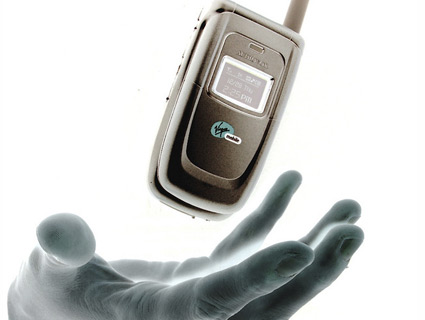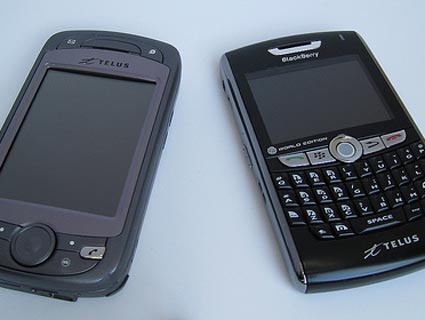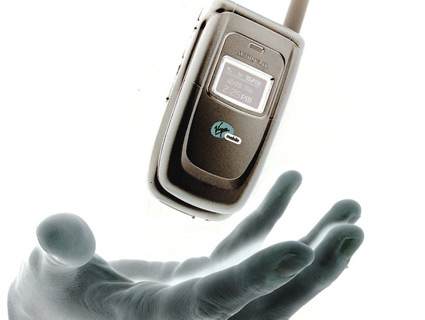
<a href="http://www.flickr.com/photos/22015699@N00/343384475/">Esther Gibbons</a>/Flickr
Is law enforcement tracking your cell phone’s GPS more like intercepting a phone call or tailing someone on the street? A federal court decision says it’s more like following you—which means the authorities don’t need to get a warrant to find out where you are at any given time.
The case involves a marijuana courier, Melvin Skinner, whose disposable cell phone was being tracked by the Drug Enforcement Agency as he moved his cargo from Arizona to Tennessee. The DEA got a court order (not a warrant) compelling Skinner’s cell phone company to share his GPS information—the release of which led to Skinner’s capture and arrest.
Skinner’s lawyers argued the DEA tracking his cell was a violation of his Fourth Amendment rights against unreasonable search and seizure because the location information being given off by his phone wasn’t publicly available.
Two judges on the three judge panel of the Sixth Circuit Court of Appeals disagreed, concluding that Skinner did not have a “reasonable expectation of privacy” regarding his cell phone GPS data. “If a tool used to transport contraband gives off a signal that can be tracked for location,” wrote Judge John Marshall Rogers,” certainly the police can track the signal.”
Catherine Crump, an ACLU staff attorney, says this kind of reasoning is disturbing. The court seems to be saying that if law enforcement is technically capable of engaging in a form of surveillance, it is free to do so.” Crump says. “But that can’t be right. The government is perfectly capable of busting down your door or reading your mail, the mere fact that the government can do that does not mean that you have no expectation of privacy in your home or with your mail.”
The ruling is disturbing for a number of other reasons outlined by Cato’s Julian Sanchez. The opinion compares GPS data to a license plate, a scent that might be followed by a police dog, or the paint job on a getaway car, but as Sanchez writes all of that is stuff you might notice just by looking around. On the other hand, cell phone GPS data can only be acquired through more direct means—like a federal agency using its authority to compel a private company to reveal its users’ data.
To be sure, the company might be physically capable of sending such a ping on its own, just as it would be physically capable of intercepting the contents of a phone call. And if it had built the phone with a secret capability to be remotely activated as a microphone, it would also be physically capable of remotely gathering information about the user’s activities in that way as well. Fortunately, the Fourth Amendment is not limited to pointlessly prohibiting only physically impossible surveillance. The technological capabilities of the phone company or the government do not determine what has been “knowingly exposed”—and it seems clear here that Skinner did not knowingly expose, to either the general public or the phone company, the precise GPS coordinates of his phone.
The judges in the majority, for their part, seems to have been working backwards from the conclusion that Skinner was guilty and that therefore the DEA was justified in obtaining his GPS data without a warrant. “The law cannot be that a criminal is entitled to rely on the expected untrackability of his tools”, wrote Judge John Marshall Rogers. “If it did, then technology would help criminals but not the police.” Of course, as Sanchez points out, the entire point of a warrant is to establish the probable cause that someone is committing an illegal act prior to invading their privacy. Rogers also argued that the evidence provided to acquire the court order would have “almost certainly have been sufficient to establish probable cause.”
In a footnote, Rogers adds that an innocent person would also not have a reasonable expectation of privacy, but by railing against the idea of “criminals” getting away because the government can’t treat Americans with cell phones like animals with RFID collars, he’s already shown his hand. It’s easier to justify intrusive government powers if your case study is a convicted drug courier. Unfortunately, if the “bad guys” don’t have rights, then none of us really do.
The Supreme Court recently ruled in US v. Jones that attaching a GPS tracking device to a suspect’s car requires a warrant. The judges in this case, however, appear to have latched onto Justice Antonin Scalia’s rationale in his majority opinion that the physical act of attaching the device was what triggered constitutional protections against search and seizure. The Supreme Court avoided concluding whether or not a GPS in a phone would similarly require a warrant.
“[This] result doesn’t make a lot of sense,” says Crump. “It is just as invasive for the government to track you through your cell phone as it is for the government to track you through your car, even more so because you have your cell phone with you 24 hours a day, people even sleep with them by their beds…If all the police have to do is track you through your phone instead of your car, then Jones doesn’t mean very much in terms of protecting Americans’ privacy.”
This case is just the latest example of the government using technological advancements as an excuse to circumvent constitutional protections. Federal authorities made more than 1.3 million requests for cell phone data last year, and presumably few of those people are hauling 1,100 pounds of marijuana down the highway. Unfortunately, as far as the Sixth Circuit is concerned, your cell phone GPS data is no more private than the color of your t-shirt, and there doesn’t seem to be much support in Congress for the bills that would actually change that.











